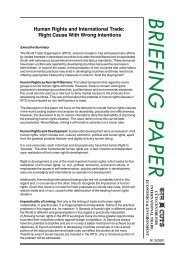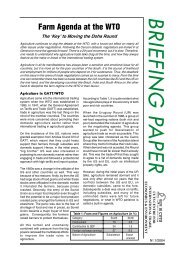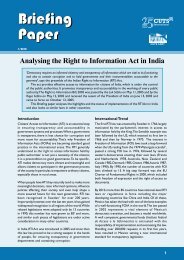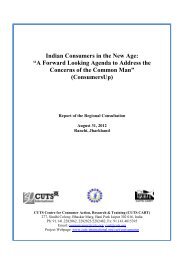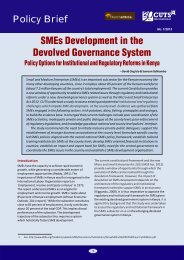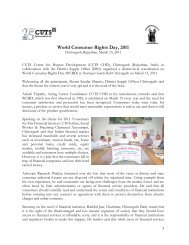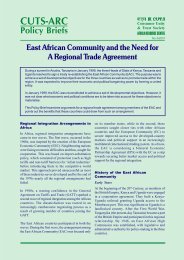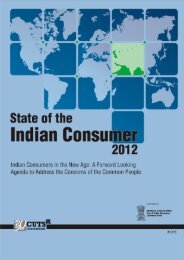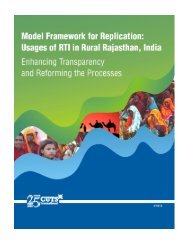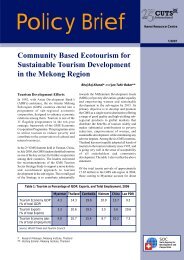Final Report - World Trade Organization
Final Report - World Trade Organization
Final Report - World Trade Organization
You also want an ePaper? Increase the reach of your titles
YUMPU automatically turns print PDFs into web optimized ePapers that Google loves.
It was noted that except for South Africa, cooperation on competition has almost been absent. There are a<br />
number of reasons for these countries not going for any kind of cooperation or are unwilling to approach<br />
other CAs for assistance. There is a general sense of apathy and disinterest in pursuing cases (low political<br />
priority, salary scales lower than that of other public sector entities etc.). There is, somewhat legitimate fear<br />
of awkward policy transfer and there are political economy issues like public perception of external interference<br />
in domestic issues (eg. privatization program).<br />
Cooperation arrangements can be very beneficial for developing countries particularly when they lack resources<br />
and experience to deal with complex anti-competitive practices of MNCs. It would provide them with an<br />
opportunity to learn and exchange information. This might also reduce jurisdictional disputes and give an<br />
opportunity to create “islands of good governance”.<br />
State of Discussions at the WTO Working Group on Interaction between <strong>Trade</strong> and Competition Policy was<br />
also briefly discussed at the meeting. A brief presentation on the proposed possible elements of a multilateral<br />
framework on competition policy was made. It was emphasised that some developing countries are concerned<br />
that competition policy would restrict their ability to use industrial policy and support small businesses according<br />
to their national development strategy. However, competition policy and law can be structured in such a way<br />
to ensure that these objectives are not compromised. It was also pointed out that any committee set up under<br />
the WTO for Competition should not be limited to narrow monitoring of the agreement but should be a forum<br />
for international debate on competition and its interface with trade and regulatory policies and laws.<br />
The last session of the meeting was on the way ahead to promote healthy competition culture, especially in<br />
developing countries. Discussions were mainly based on the experiences gathered during the implementation<br />
of the project and the suggestion made by different stakeholders in the project countries and other experts<br />
during several meetings organised at different levels.<br />
But before going for a discussion on the way ahead some concluding observations on the previous sessions<br />
were made:<br />
l Success in implementing competition law in developing countries is a matter of credibility as well as<br />
resources.<br />
l Political will is crucial to success. In several cases, it is seen that the CA may have the will to try and act<br />
even when the government is blocking it.<br />
l Personality of CA head may be important<br />
l Case studies show that it is possible to impose conditions on mergers of MNCs.<br />
l Alleged predation did arise in the case studies: allegations of unfairly cheap imports is a key concern in<br />
some countries, like Zambia.<br />
l There is very little cooperation as yet, but where it was requested, it paid off. However, there might be a<br />
need for an asymmetric agreement so that developing country Authorities would not have to respond to<br />
information requests in the same way.<br />
On the basis of the presentations made under this session, certain common needs were identified for all<br />
countries of the project. The important ones are:<br />
l Cooperation between regulatory authorities and CA: a regulatory forum exists in South Africa but it might<br />
be more on paper than in practice.<br />
l Necessity of a strong consumer movement. It is reasonably strong in India and growing Pakistan but not<br />
so in other countries.<br />
l The laws need to be translated in simple language and people need to be educated<br />
l Zambia Competition Commission has the best structure. Though all stakeholders are not fully educated,<br />
this is the only CA which has maximum representation<br />
For a small country, there is not necessarily a need for a separate consumer protection law but the competition<br />
law can be further improved upon to include consumer protection provisions.



